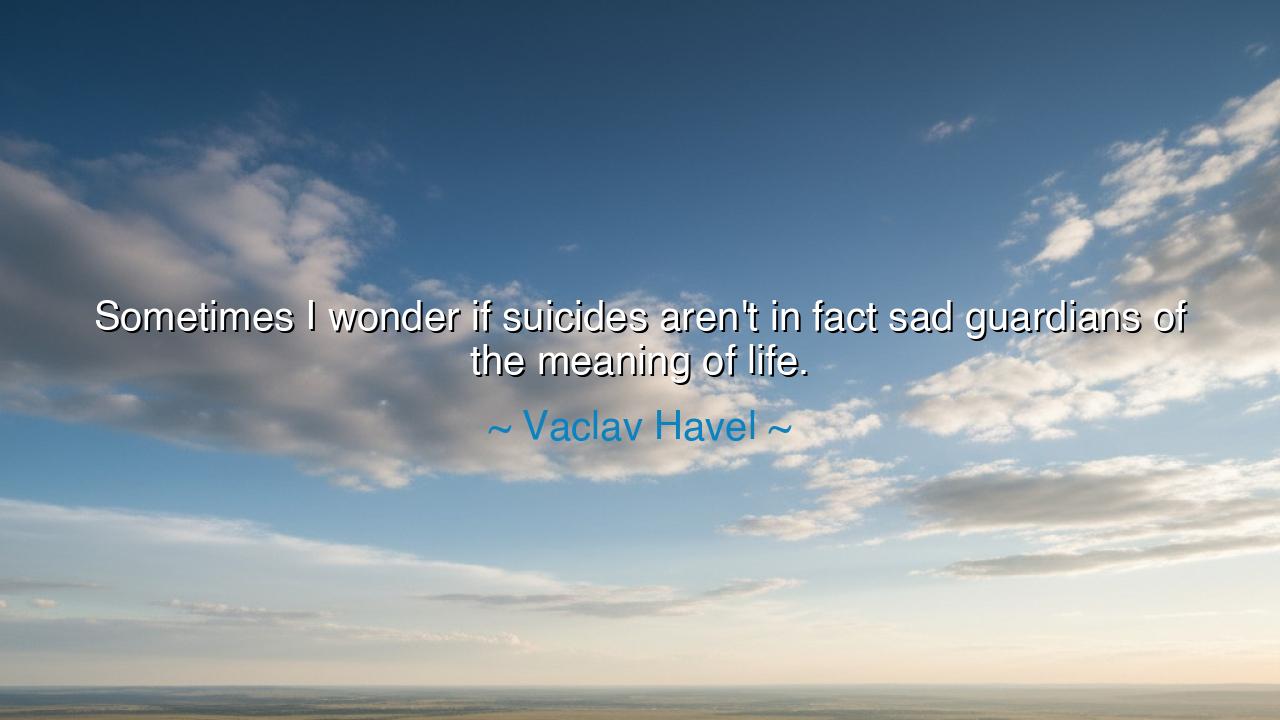
Sometimes I wonder if suicides aren't in fact sad guardians of






The words of Václav Havel, “Sometimes I wonder if suicides aren't in fact sad guardians of the meaning of life,” come from the deep contemplations of a man who lived between despair and duty, oppression and hope. A playwright, philosopher, and later the president of a liberated Czechoslovakia, Havel knew the dark corridors of the human spirit — those places where meaning flickers like a fragile candle in a storm. In this haunting reflection, he does not glorify death, but reveals a paradox: that those who have come closest to surrender often perceive most clearly the value of life. Their pain, though tragic, becomes a mirror through which the rest of us glimpse the sacredness of existence.
To call suicides “sad guardians” is to recognize that within their despair lies a terrible wisdom. They are the sentinels who stand at the border between life and death, gazing into the abyss so that others might remember how precious it is not to fall into it. They remind us — through their silence, their struggle, and their loss — of the fragility of meaning. It is as though they hold a grim watch over the boundary of hope, showing by their absence how vital hope truly is. Havel’s insight, born from his time as a prisoner under communist tyranny, carries the quiet ache of one who has seen how easily the soul can fracture when stripped of freedom, love, or faith. And yet, his words are not without compassion; he sees in the act of despair not sin, but the shadow of longing — the longing for life to be more bearable, more luminous, more true.
In the ancient world, philosophers often stood at the same threshold of contemplation. Seneca, the Roman Stoic, wrote of suicide not as defiance but as the tragic consequence of a soul deprived of meaning. He believed that the highest task of man was to endure — to find purpose even amid suffering. Yet even Seneca acknowledged that those who end their lives are driven not by weakness alone, but by a recognition of life’s unbearable contradictions. Havel’s words echo this ancient understanding: that despair, though destructive, is born from an awareness of life’s deep hunger for significance. Those who succumb to it often feel too deeply, dream too earnestly, love too intensely — and when meaning seems absent, they are crushed beneath the very weight of their yearning.
Consider the story of Virginia Woolf, the great English writer whose brilliance and pain coexisted in fragile harmony. She saw life with unbearable clarity — every joy, every sorrow, every fleeting tremor of beauty — until the noise of existence became too much to bear. Before she walked into the River Ouse, she wrote, “I feel certain that I am going mad again... and I shan’t recover this time.” Her words, like Havel’s, are filled with sorrow, but also with understanding: she knew the cost of consciousness. Through her life and her art, she revealed that those who live at the edge of despair are not alien to meaning — they are its mourners, its defenders, its tragic witnesses. They remind us of the cost of being human.
Havel’s own life was one of endurance rather than escape. Imprisoned, censored, and isolated, he faced despair’s shadow but refused to let it claim him. It is from this proximity to darkness that his compassion for the despairing emerged. He saw that the suicidal are not cowards but souls who could not find enough light to go on. And yet, by their very struggle, they reveal how precious light is. Their suffering becomes a sorrowful warning — that when meaning is neglected, the spirit begins to decay. In this way, they become guardians not by choice, but by consequence: through their tragedy, they force us to ask, “Why do we live? What gives life worth? What flame must we protect so that we do not join them?”
There is a painful nobility in Havel’s observation, a recognition that the search for meaning is humanity’s greatest battle. Those who lose it fall, but those who witness their fall are called to deeper compassion, to vigilance of the soul. We are reminded that meaning does not come ready-made — it must be cultivated through love, service, faith, and connection. If despair is the absence of meaning, then hope is its resurrection. And to live, even when life feels hollow, is to affirm that meaning can be found again, even in the ashes of suffering.
The lesson, then, is solemn but redemptive: do not judge the despairing — learn from them. Their silence speaks of a truth too terrible to utter — that life without purpose becomes unbearable. Let their memory awaken in you a tenderness for those who struggle, and a vigilance for your own spirit. Tend your inner flame. Seek out the threads of beauty and meaning that hold you to this earth — the face of a loved one, the call of conscience, the song of dawn breaking after a long night. Havel reminds us that even when the guardians fall, their sorrow is not in vain — for they teach us, with their final gesture, that the meaning of life is fragile, sacred, and must be fiercely protected.
And so, my listener, remember this: despair is not the end, but the warning bell of the human soul. When you hear it — in yourself or another — do not turn away. Lean closer. Offer presence, kindness, and faith. For life is not made meaningful by its ease, but by its endurance — by the courage to keep the flame alive even when the night feels endless.






AAdministratorAdministrator
Welcome, honored guests. Please leave a comment, we will respond soon